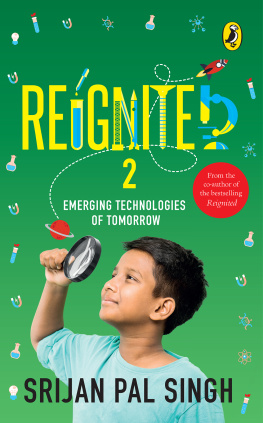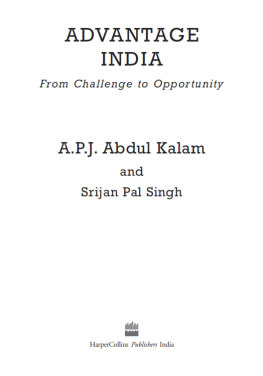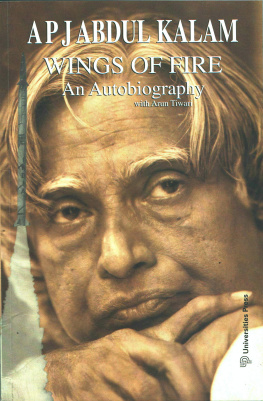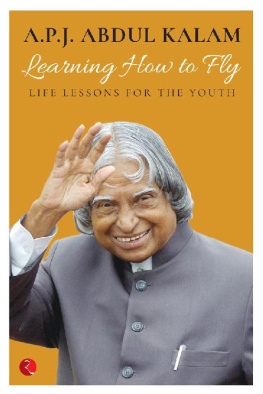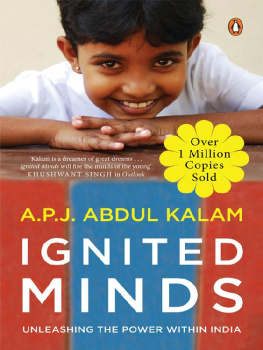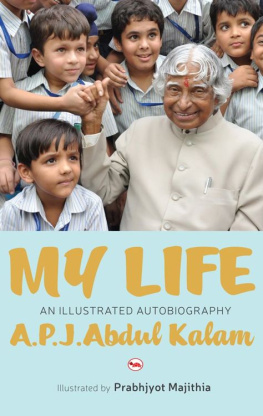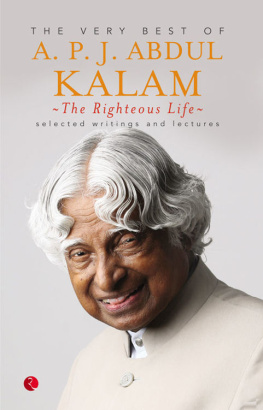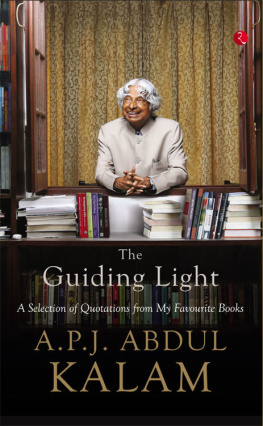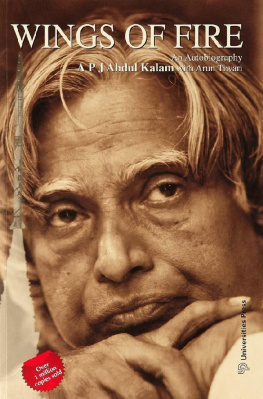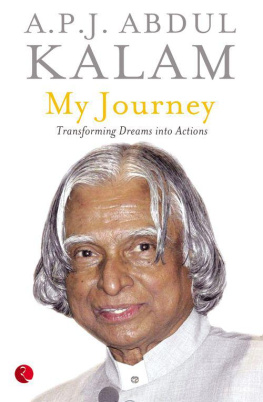Srijan Pal Singh - What Can I Give?: Life Lessons From My Teacher, A.P.J. ABDUL KALAM
Here you can read online Srijan Pal Singh - What Can I Give?: Life Lessons From My Teacher, A.P.J. ABDUL KALAM full text of the book (entire story) in english for free. Download pdf and epub, get meaning, cover and reviews about this ebook. year: 2016, publisher: Penguin UK, genre: Detective and thriller. Description of the work, (preface) as well as reviews are available. Best literature library LitArk.com created for fans of good reading and offers a wide selection of genres:
Romance novel
Science fiction
Adventure
Detective
Science
History
Home and family
Prose
Art
Politics
Computer
Non-fiction
Religion
Business
Children
Humor
Choose a favorite category and find really read worthwhile books. Enjoy immersion in the world of imagination, feel the emotions of the characters or learn something new for yourself, make an fascinating discovery.

- Book:What Can I Give?: Life Lessons From My Teacher, A.P.J. ABDUL KALAM
- Author:
- Publisher:Penguin UK
- Genre:
- Year:2016
- Rating:4 / 5
- Favourites:Add to favourites
- Your mark:
- 80
- 1
- 2
- 3
- 4
- 5
What Can I Give?: Life Lessons From My Teacher, A.P.J. ABDUL KALAM: summary, description and annotation
We offer to read an annotation, description, summary or preface (depends on what the author of the book "What Can I Give?: Life Lessons From My Teacher, A.P.J. ABDUL KALAM" wrote himself). If you haven't found the necessary information about the book — write in the comments, we will try to find it.
What Can I Give?: Life Lessons From My Teacher, A.P.J. ABDUL KALAM — read online for free the complete book (whole text) full work
Below is the text of the book, divided by pages. System saving the place of the last page read, allows you to conveniently read the book "What Can I Give?: Life Lessons From My Teacher, A.P.J. ABDUL KALAM" online for free, without having to search again every time where you left off. Put a bookmark, and you can go to the page where you finished reading at any time.
Font size:
Interval:
Bookmark:


PENGUIN BOOKS

PENGUIN BOOKS
PENGUIN BOOKS
Srijan Pal Singh studied at the Indian Institute of Management, Ahmedabad, where he won a gold medal for the best all-rounder student and was the student-council head. He has worked with the Boston Consulting Group (BCG) in a Naxalite-affected region to establish a transparent public-distribution system using technology interventions. He was nominated as one of the Global Leaders of Tomorrow at the St. Gallen Symposium in Switzerland.
Srijan has actively travelled across rural India and participated in various international initiatives to study and evolve sustainable development systems. Many of his articles on sustainability and development have been published in reputed journals. Srijan has actively worked with Dr Kalam to promote better-quality education which inspires young minds.
A young mind is like clay. It can be moulded into any shape desired by a master craftsman. A teacher is such an artist.
Greatness is not visible externally; it lies within. Blessed is the man who comes across a guru who can tap into ones iceberg of potential.
This story is about one such exemplary teacher who changed my life forever and showed me who I truly am.
This story narrates how my childhood hero turned into a real lifelong mentor. It is about the days, lessons and lives shared between two peopleone, a fresh graduate in his mid-twenties and the other, a man thrice his age. This is the story of Dr A.P.J. Abdul Kalam and the lessons I learnt from him, from the wisdom that shone through in his conversations, lunches, dinners, travels, discussions and the occasional argument.
Many of the stories that I share here are everyday events, albeit with extraordinary and unconventional lessons hidden in them. And this is what made Dr Kalam a great guru; he could polish ordinary pebbles into pearls of wisdom and share them with the world.
In 2002, when I was barely eighteen, an amazing piece of news was taking the entire nation by storm. A paperboy, who had failed to become a pilot and become a space scientist insteada missile man, a nuclear researcherwas on the verge of becoming the eleventh President of the nation. It was one of those rare occasions in politics when the citizensthat too, almost unanimouslywere thankful to the political leaders for taking such a great decision. The papers and television news channels were abuzz with the story of his humble origins, his lifestyle, his books, his food habits and, of course, his hairstyle! A man without any particular political affiliation and with no organizational support was making his way to the highest office of the nation.
William Shakespeare wrote, Some are born great, some achieve greatness and some have greatness thrust upon them.
Dr Kalam fulfilled all three categories of greatness.
Despite his humble beginnings, Dr Kalam was born with greatness ingrained in him. He was a Muslim born in Rameswaramconsidered one of the holiest of towns by Hinduswho went on to receive a Christian missionary education for a large part of his formative years, and his best friend was the son of a local Hindu priest. His dreams of flying high were nurtured by a school teacher, Sri Siva Subramaniam Iyer, in a country which was not politically independent yet. Few souls get to experience such diversity of society and religion, imbibing the unflinching hunger of impossible dreamsthat too in their early years.
Dr Kalam was then refined in the fires of failurebe it the failure to become a fighter pilot as a young graduate or the failure of the first Satellite Launch Vehicle (SLV) in 1979.
And he learnt how to overcome failures through his undying effort and perseverance. The difference between Dr Kalam and a lot of us is not the lack of troubles or failures, but the fact that all his failures taught him how to navigate his way through life. He would embrace these failures, and its those invaluable lessons that enabled him to make more formidable attempts the next time around. He wore his failures like badges, and he valued them as much as his successes; at no point was he embarrassed to speak of them. Dr Kalam had the courage to take the bull by its horns and that is what made him great.
Throughout his career as a scientist, Dr Kalam was managing the technological ascent of a country that was still struggling with its myriad prejudices and internal conflicts. It was only because he seemed to truly rise above these ingrained attitudesa seemingly impossible taskand was respected in equal measure by all, that he was considered a great president.
In the finer form of Hindi, the language of my home state, Uttar Pradesh, there is a word for those who are loved by allsarvapriya. And there is a word for those who rise and become so powerful that no rival can defeat themajaya very popular name across the country.
But besides these two, there is another worda more powerful one. Ajatashatrua man so loved that he has no rivals. Dr A.P.J. Abdul Kalam was a rare Ajatashatru of our times. He was rarely criticized, and even when he was, he handled it with grace.
In September 2015, six weeks after his demise, I was in Chennai, interacting with a small group of children in a government school. I asked them, When you grow up, what would you like to become? All of them spontaneously raised their hands and shouted in unison, Kalam!
Bharat Ratna Dr A.P.J. Abdul Kalam is best known for the generations he has inspiredto dream, excel and rise. He has shown his countrymen that hard work, sincerity and talent do bear fruit in the long run, and the choices and efforts we make in our lifetime can transcend the odds that we are born with.
Once, during a visit to Australia, in 2012, a professor introduced Dr Kalam to the class, saying, Even in his eighties, for the youth of India he commands the respect of a sage and the charisma of a rock star.
Of course, Dr Kalam had a soft spot for the youth. I remember him saying many a time, Up to the age of seventeen, the mind of a youth can be shaped. Beyond that it becomes difficult. Hence, he dedicated a large part of his life, during his presidential rule and beyond it, trying to shape the minds of the Indian youth. He wanted them to have three traitsrighteousness, creativity and courage. He even formulated an equation, which he called the Knowledge Equation, where knowledge is a sum of these three traits. He said, Knowledge makes you great. In four simple words he had outlined the pathway to greatness; such was the simplicity of Dr Kalam.
Dr Kalam paid attention to the minutest details. He and I co-authored three books and worked on over a thousand speeches that he delivered. And he would insist on revisiting each sentence multiple times and refining it till he was satisfied. It was not uncommon for us to go through twenty drafts of any important speech. Yet, minutes before going up on stage he would often say, Srijan, what are the new things we are going to talk about in this lecture? Always looking to improve, he was ever eager for the next version.
On stage, he would look at the audience, their faces and expressions, whether they were in the shade or under the sun, and then point to a stray group of children huddled in a corner of the hall, in an audience of grown-ups, and tell me, Add that poem in the speech for the children out there. He was apolitical but he understood people and their needs better than any veteran politician.
Font size:
Interval:
Bookmark:
Similar books «What Can I Give?: Life Lessons From My Teacher, A.P.J. ABDUL KALAM»
Look at similar books to What Can I Give?: Life Lessons From My Teacher, A.P.J. ABDUL KALAM. We have selected literature similar in name and meaning in the hope of providing readers with more options to find new, interesting, not yet read works.
Discussion, reviews of the book What Can I Give?: Life Lessons From My Teacher, A.P.J. ABDUL KALAM and just readers' own opinions. Leave your comments, write what you think about the work, its meaning or the main characters. Specify what exactly you liked and what you didn't like, and why you think so.

